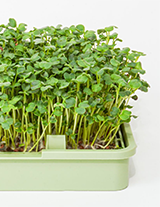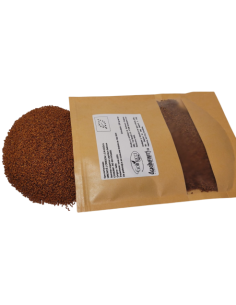
Hydroponics or aquaponics is a method of growing plants directly in a pond of water without using soil. A vertical medium is used to support the sprouts or micro-plants (sand, gravel, hemp).
Babylon Garden uses the last of the listed media to maintain humidity and gradually release water from the pond.
Hydroponics or nutrient water, was rediscovered in the 1930s at the University of California, Berkeley. Dr Gericke popularised this method of growing vegetables as sprouts, shoots (microgreens), but also as mature plants.
In principle, any type of crop can be grown in a hydroponic/aquaponic system, aided by a system that keeps the plants upright, moist and aerated.
However, it is important to note that not all vegetables grown hydroponically give a satisfactory yield, this depends on both the type of vegetable and the quality of the seed; hydroponic crops require quality young seed kept in cool, dry places to ensure maximum germination.
Advantages of hydroponic systems:
- The main advantage is labour saving through automatic watering and fertilisation for intensive crops.
- Hydroponic systems are ideal for urban centres and can be installed indoors.
- Outdoor temperature is not a factor as long as plants are kept indoors at 19-22 degrees Celsius.
- Growing sprouts does not depend on light and microplants do not necessarily require natural light.
- Hydroponic systems use much less water than conventionally grown plants (approx. 90%)
- In addition to fertilisers and reduced water consumption, the carbon footprint is reduced by avoiding sending vegetables thousands of kilometres and disposable packaging is rarely recycled.
- They are highly nutritious, both sprouts and microplants enjoy up to 40 times more nutrients than conventional vegetables.

 Microgreens
Microgreens

























